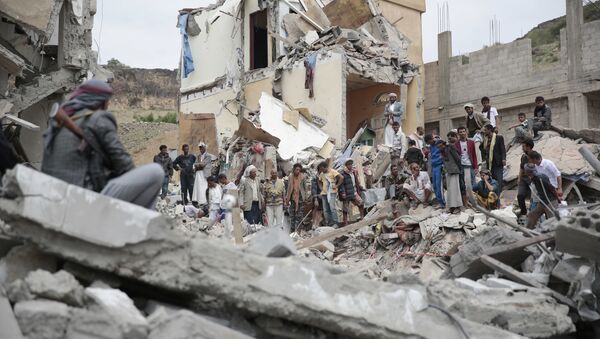MOSCOW (Sputnik) – The international community should convince the Saudi-led coalition in Yemen to reopen the country’s ports amid the dire humanitarian situation the nation is facing, Shane Stevenson, Oxfam country director in Yemen, told Sputnik.
The Saudi-led coalition against Houthi insurgent movement in Yemen said it was closing the country’s ground, air and sea ports to halt alleged arms delivers to Houthis from Iran. The step was made after an alleged ballistic missile attack against Riyadh from Yemen. Following the move, UN humanitarian chief Mark Lowcock warned that the blockade might result in the largest famine in the world in many decades, bringing millions of victims.
"The blockade now not only prevents any humanitarian aid to be delivered to Yemen but will also lead to further increase of food prices beyond the purchasing power of the average Yemeni, greatly worsening the food insecurity situation. If the blockade persists, the country could imminently collapse into famine, particularly in rural areas," Stevenson pointed out.
The Oxfam representative called the worsening Yemeni situation "the worst humanitarian crisis in the world," echoing statements of EU Humanitarian Aid and Crisis Management Commissioner Christos Stylianides, as well as UNICEF and other international organizations.
"Oxfam will continue doing everything we can to support the people of Yemen in order to abate the deterioration of the situation and prevent further suffering. We will use everything at our disposal until we have nothing left," Stevenson concluded.
Yemen has been engulfed in a violent conflict between the government headed by President Abd Rabbuh Mansur Hadi and the Shiite Houthi movement, also known as Ansar Allah, and backed by army units loyal to former President Ali Abdullah Saleh. Since March 2015, the Saudi-led coalition of mostly Persian Gulf countries has been carrying out airstrikes against the Houthis at Hadi's request.
Commenting on the recent developments on the Arabian peninsula in an interview with Radio Sputnik, Ali Rizk, who has been a freelance journalist for 11 years, said that the blockade could lead to further escalation of the conflict in Yemen.
Karl Schembri, Regional Media Adviser in the Middle East with the Norwegian Refugee Council has also spoken about the Yemeni blockade with Sputnik, saying it not only resulted in the deterioration of the humanitarian situation in the war-torn country but also resulted in an increase in fuel prices.
The spokesperson for the Near and Middle East with the International Committee of the Red Cross, Iolanda Jaquemet, has also warned of dire consequences that the blockade may bring, saying that if it lasts for more than a few days it will have a "catastrophic" effect on Yemeni civilians.



